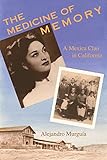The Medicine of Memory : A Mexica Clan in California / Alejandro Murguía.
Material type: TextPublisher: Austin : University of Texas Press, [2021]Copyright date: ©2002Description: 1 online resource (256 p.)Content type:
TextPublisher: Austin : University of Texas Press, [2021]Copyright date: ©2002Description: 1 online resource (256 p.)Content type: - 9780292796379
- 929/.2/0973 21
- online - DeGruyter
| Item type | Current library | Call number | URL | Status | Notes | Barcode | |
|---|---|---|---|---|---|---|---|
 eBook
eBook
|
Biblioteca "Angelicum" Pont. Univ. S.Tommaso d'Aquino Nuvola online | online - DeGruyter (Browse shelf(Opens below)) | Online access | Not for loan (Accesso limitato) | Accesso per gli utenti autorizzati / Access for authorized users | (dgr)9780292796379 |
Frontmatter -- Contents -- Preface: Maize for the Metate -- Phantoms in the mirror -- The “good old mission days” never existed -- Josefa of Downieville: The Obscure Life and Notable Death of a Chicana in Gold Rush California -- Triptych: Memories of the San Fernando Valley -- Gathering thunder -- Tropi(lo)calidad Macondo in La Mission -- Petroglyph of memory -- The Marin headlands: A Meditation on Place -- The homecoming of an Azteca-mexica clan -- Notes -- Selected bibliography -- Acknowledgments
restricted access online access with authorization star
http://purl.org/coar/access_right/c_16ec
"People who live in California deny the past," asserts Alejandro Murguía. In a state where "what matters is keeping up with the current trends, fads, or latest computer gizmo," no one has "the time, energy, or desire to reflect on what happened last week, much less what happened ten years ago, or a hundred." From this oblivion of memory, he continues, comes a false sense of history, a deluded belief that the way things are now is the way they have always been. In this work of creative nonfiction, Murguía draws on memories—his own and his family's reaching back to the eighteenth century—to (re)construct the forgotten Chicano-indigenous history of California. He tells the story through significant moments in California history, including the birth of the mestizo in Mexico, destruction of Indian lifeways under the mission system, violence toward Mexicanos during the Gold Rush, Chicano farm life in the early twentieth century, the Chicano Movement of the 1960s, Chicano-Latino activism in San Francisco in the 1970s, and the current rebirth of Chicano-Indio culture. Rejecting the notion that history is always written by the victors, and refusing to be one of the vanquished, he declares, "This is my California history, my memories, richly subjective and atavistic."
Mode of access: Internet via World Wide Web.
In English.
Description based on online resource; title from PDF title page (publisher's Web site, viewed 26. Apr 2022)


